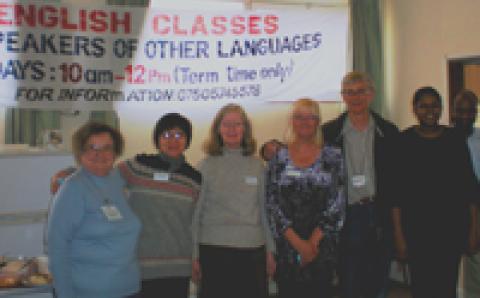CRC-RCA Reunion
I did miss some important substance in the reports of the “historic” joint meeting of CRC and RCA synods (“RCA and CRC Synods Meet in Historic Joint Session” and “The More We Get Together,” July 2011). Your editorial lists several quaint disputes that contributed to the separation of the two denominations in 1857, but does not mention the substantial issue of Masonic Lodge membership. Both before and after 1857 there was extensive Scripture study, soul searching, and prayer regarding Lodge membership. Many of the congregations and individuals who joined the CRC did so because of a profound belief that Lodge membership can severely compromise our mutual accountability as disciples of Christ. This has not changed.
—Rev. Jack VanderVeer
Calgary, Alberta
In 1989 I was an elder delegate to the RCA assembly, which met in the gymnasium of Calvin College the same week the CRC held their synod in Calvin’s FAC (now called the Covenant Fine Arts Center). We held joint worship services in the morning sessions, shared the dining hall for meals, and met for social hours. One evening we worshiped together at LaGrave CRC. I understood that joint synod to be the “first ever” to meet and discuss reunification since 1857. . . .
I pray our recent reunification dialogue can continue, but I fear it, too, will lose steam and fade away.
We are quite far apart, and I doubt we can be one family. But with God all things are possible.
—Raymond Leerar
Orland Park, Ill.
In your editorial you list four reasons the CRC separated from the RCA, but not two other reasons that seemed important to the CRC at the time. One was that the RCA allowed her members to also join lodges, while the CRC taught that allegiance should be given to God and not to a secret society. The other reason was a no-excuse dedication to Christian education on the part of CRC members, while many RCA members sent their children to public schools. This conviction was so dearly held that a gentleman in our church who (gasp) was a teacher in a public school was not allowed to become an officer in the church. Even in grade school I thought that was just wrong! In this day and age, it’s time for us to get back to doing God’s work together. I’m happy to see signs of that possibility.
—Jean Brayman
Fremont, Mich.
The CRC holds such a strong position against Lodge membership that Acts of Synod 1900 (pp. 96-101) documents this issue, and it was confirmed by synods in 1958, 1974, 1975, and 1977.
—Allan A. Stonehouse Jr.
Englewood, Fla.
Online Comments
I have been engaged in a discussion regarding the news story you published online June 14 concerning Synod 2011’s decision not to re-examine the CRC’s policy regarding its gay and lesbian members (“No New Study of Homosexuality,” July 2011). This discussion took place via the comment box following the online article. I am writing to thank you for making this forum available. The discussion was at times angry, and it seemed hopeless that any good would ever come of the effort. However, over the past two days, at least some of the participants achieved a level of respectful dialogue that seemed impossible just a few days earlier. I was moved by this experience. Thank you again for hosting such discussions. I just wish there were a way to include a broader audience.
—John Slagter
Grand Rapids, Mich.
Storybook Characters?
This time it’s retired pastor George Vander Weit who looks at brothers Cain and Abel as storybook characters who “teach us truths about our relationship to God, others, and ourselves” (FAQs, June 2011).
Hebrews 11 speaks of Cain and Abel as real people, not mythological characters. John further confirms the historicity of the brothers (1 John 3:12).
We must be careful when nullifying Scripture. Jesus told Nicodemus, “I have spoken to you of earthly things and you do not believe; how then will you believe if I speak of heavenly things?” (John 3:12).
On the other hand, it was refreshing to read of Redeemer biology professor Gary Chiang, who is a young-earth creationist (“Redeemer University Students Enter Faith and Science Debate,” p. 16).
—Russ Hoekman
Lakewood, Calif.
What did Jesus mean when he said ". . . so that on you may fall the guilt of all the righteous blood shed on earth, from the blood of righteous Abel to the blood of Zechariah" (Matt. 23:35)? What does it mean in Hebrews 12:24 that "[We] have come to . . . Jesus the mediator of a new covenant, and to the sprinkled blood that speaks a better word than the blood of Abel"? By questioning the historicity of Abel's blood shed by Cain, we are dealing with much more than the first 11 chapters of Genesis.
—Margaret Fraser
Lethbridge, Alberta
Love Wins?
I was utterly disappointed by “Love Wins?” (Tuned In, May 2011). Though he at first seems to defend the classic view of hell, nevertheless John Van Sloten speaks of “the Bible’s ambiguity” on the issue of hell.
There is coming a “day of wrath” (Rom. 2), and that wrath remains (even now) on all those who are not in Christ Jesus through faith in him (John 3:36). That is what Jesus refers to as hell.
I have a background in both evangelicalism and mainline churches, and what I have seen in both has been a shallowness in and apathy to theological, doctrinal truth.
Why not pray that Truth wins?
—Eric Roessing
Holland, Mich.
I'm always grateful for The Banner's book reviews. However, the review of Rob Bell's book Love Wins really missed the point. To me Bell's thesis is that we have so narrowly construed the discussion concerning the saved and the damned that we have forgotten the radical nature of grace.
Is our tradition so afraid of the term "universal salvation" that we have shut the doors to those who need to hear the gospel? I assume everyone is saved and treat everyone like brothers and sisters, never giving up hope, and assuring "non-believers" that they don't have to wait until they die to know the love of God; they can experience that love now. So let us open the doors wide and press everyone to come in to celebrate the Great Feast.
—Henry Venema
Brandon, Manitoba








